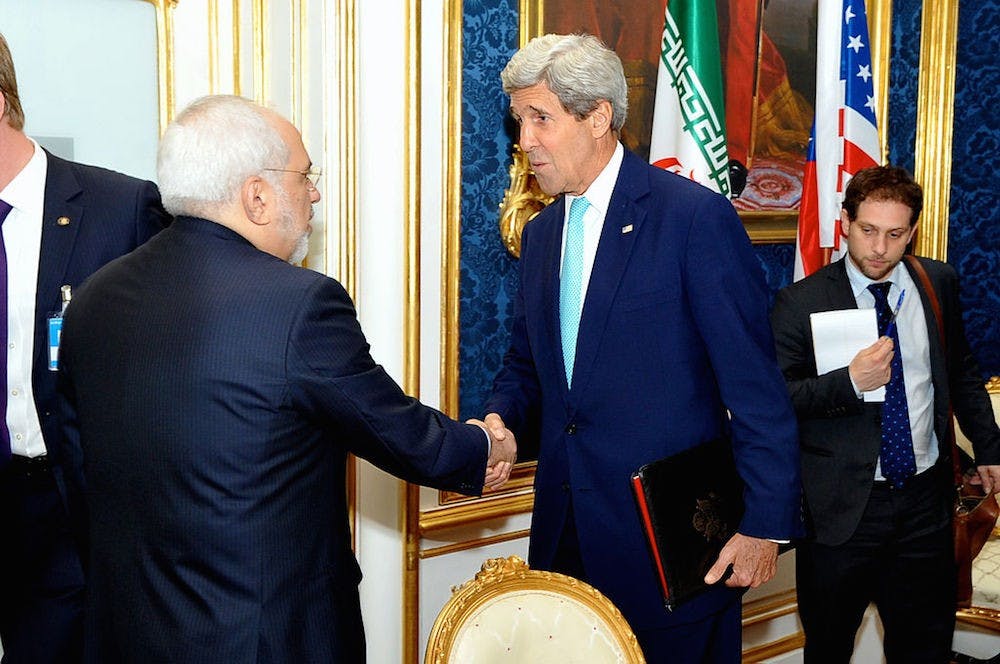What's up, Doc? is a Q&A series where The Collegian asks a University of Richmond professor five questions on a prominent current events topic that aligns with their expertise.
Ever since the United States and five other countries agreed to a historic nuclear deal with Iran, the parameters of the deal have been a highly contentious topic. Sheila Carapico, professor of political science and international studies, will be one of four experts discussing the Iran Deal at the Jefferson Hotel Tuesday night. She answered some questions for The Collegian regarding the deal in advance of Tuesday's forum.
Jack Nicholson: You will be one of four experts speaking at a panel Tuesday evening titled, The Iran Nuclear Deal: Boon or Bane? What do you think – is the deal a boon or bane for America?
Sheila Carapico: I think the controversy over this agreement indicates that it is a mixed blessing for the US. Some Americans obviously believe that any reduction of belligerency between the United States and Iran is fool-hardy. Yet the majority of diplomats, arms experts, senior statesmen, and Middle East specialists, plus many US-based multinational corporations, sense that there will be benefits for Americans, and perhaps something like an overall ‘peace dividend.’ It is interesting that Washington intends to increase arms transfers to Israel and Saudi Arabia and to augment the already extensive US military presence in countries and waterways surrounding Iran – to project more American firepower.
JN: Barack Obama told an audience at American University that the Iran Deal was the most important American foreign policy debate since the Iraq War. Why is this agreement so important?
SC: President Obama considers it a breakthrough in non-proliferation negotiations, and an important instance (the first in quite a while) of American leadership of a multilateral decision arrived at collectively by the five permanent members of the United Nations Security Council (plus Germany). It stands in sharp contrast with the unilateral American decision – bypassing the United Nations, and discrediting the United Nations Special Commission (UNSCOM)’s coercive inspection and destruction of Iraq’s most odious weapons during the nineteen nineties – to invade Iraq in 2003. Obviously, it is a move to avoid, rather than to initiate, armed conflict, and to strengthen the non-proliferation regime
JN: How does this deal affect Iran's influence over other countries throughout the Middle East?
SC: Iran’s regional influence is limited to the relatively few countries with Shi’a majorities or minorities. Ironically, the US invasion of Iraq inadvertently increased Iranian influence there. Bahrain’s the Shi’a majority’s democratic aspirations have been crushed by the ruling Sunni family and Saudi tanks. Iran has some ties to Shi’a minorities in three countries: Lebanon, where it supports the Hizbollah militia; Syria, where Tehran is one of the few allies of President Bashar al-Assad; and Yemen, where it favors the Houthi insurgency against the Saudi-backed government-in-exile. The Gulf monarchies led by Saudi Arabia are angry about what a Kuwaiti columnist recently called “rapprochement with Iran behind the backs of America’s GCC (Gulf Cooperation Council) allies,” adding that this will “embolden” Iran. To offset Iranian influence, the GCC are increasing their own military spending and aid to Arab countries like Egypt, Jordan, and Morocco.
JN: Israeli Prime Minister Benjamin Netanyahu called the deal "a stunning historic mistake." Why would Netanyahu and other Israelis so vehemently condemn the deal?
SC: Prime Minister Netanyahu tried to convince Congress and the American public that the normalization of relations with Iran would be hazardous for Israel. His concerns include the possibility that as Iran’s economy recovers from the crippling effects of sanctions its ability to help Hizbollah, in particular, may increase: the “cash bonanza will fuel Iran’s terrorism worldwide,” said the Prime Minister. While Israel’s significant nuclear arsenal, fortified by American security guarantees, are a powerful deterrent, Netanyahu does not believe in negotiating with “a rogue regime.”
JN: To your understanding, how have the Iranians received the agreement?
SC: Iranian officials and citizens look forward to an easing of economic as well as military sanctions. In addition to trade bans imposed by Washington after the 1979 revolution and the hostage crisis, and others enacted Europe, since 2006 the United Nations mandated embargos on Iranian oil, banking, finance, shipping, and other industries, including penalties for companies doing business with Iran. These have hurt the Iranian economy as a whole, many businesses, consumers in general, and a lot of individuals. Even pharmaceuticals are scarce. The desire for normal trade and travel is widespread.
Enjoy what you're reading?
Signup for our newsletter
Contact editor-in-chief Jack Nicholson at jack.nicholson@richmond.edu
Support independent student media
You can make a tax-deductible donation by clicking the button below, which takes you to our secure PayPal account. The page is set up to receive contributions in whatever amount you designate. We look forward to using the money we raise to further our mission of providing honest and accurate information to students, faculty, staff, alumni and others in the general public.
Donate Now



